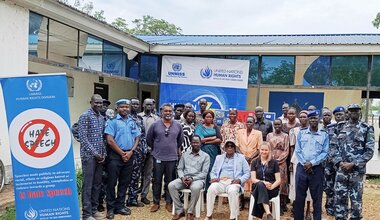Rape and sexual violence continuing in South Sudan, UN envoy says
6 October 2014 - The horrors of sexual violence in South Sudan had not ended with the country’s ceasefire agreement, a senior UN official said today in the capital Juba.
Speaking on UN Radio Miraya during her first visit to the country, Special Representative of the Secretary-General on Sexual Violence in Conflict Zainab Bangura called on the nation’s citizens to stand together and say “enough is enough”.
“If allowed to continue, these rapes will haunt South Sudan for generations to come,” she said, adding that they would also “undermine the peace that South Sudan has fought for”.
Ms. Bangura said that armed men – civilians and soldiers from all parties to the conflict – were responsible, and some were carrying on with the acts. “I have come to South Sudan to demand that all parties of conflict end the raping and the violence.”
Since the latest outbreak of conflict in South Sudan last December, many innocent women, men, girls and boys have been subjected to attacks, she said.
“These included rapes, gang rapes, rapes with guns and bullets and sexual slavery,” the special representative said. “After being raped, some victims were mutilated and disgraced. Some were killed or died of the injuries sustained."
A report released by UNMISS in May confirmed that civilians were not only caught up in the violence, they were directly targeted, often along ethnic lines.
Primarily based on more than 900 interviews with eye witnesses and victims, the report gives a succinct timeline of the conflict, which was sparked by a political dispute between President Salva Kiir, who belongs to the Dinka ethnic group, and former Vice-President Riek Machar, who belongs to the Lou Nuer.
The report finds that “from the very outset…gross violations of international law…occurred on a massive scale.”
Ms. Bangura urged both parties to ensure that those responsible were brought to account, telling the culprits, “We will come after you, there is no hiding place.”
She called on local communities, national governments and the international community to give those who have suffered rape the care and support they need.
“It is the rapists who should be shunned and shamed, not those who were raped,” she said. “What happened to you was not your fault. You are not alone.”
During the first day of her six-day visit, Ms. Bangura also visited internally displaced persons living in Protection of Civilians sites at UN House in Juba.
 UN
UN United Nations Peacekeeping
United Nations Peacekeeping





